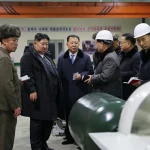They’re in our phones, cars, planes, and even fridges.
Semiconductor chips have become critical for the modern way of life, and the biggest semiconductor foundry companies rake in billions of dollars from widespread demand.
Visual Capitalist's Marcus Lu and Pallavi Rao show in the following chart, the largest semiconductor foundry companies by their percentage of global revenues in Q1 2023, using data sourced from Trendforce.
ℹ️ We highlight data for companies that only operate foundries (fabrication plants) that manufacture chips for clients, also known as a “pure-play” foundries, as well as companies that design and manufacture their own chips, known as integrated device manufacturers. “Fabless” manufacturers that only design and don’t manufacture their own chips are not included.
Semiconductor Foundry Companies by Revenue
At the top of the list and dwarfing every other company by revenue share is TSMC which earned 60% (or nearly $17 billion) of the entire industry’s revenue in Q1 2023.
Founded in 1987, TSMC is a pure-play foundry that has become Taiwan’s largest company and manufactures products for a host of clients including Apple, NVIDIA, and AMD.
Note: Revenue based on the following conversion rates: USD 1 = WON 1,276; USD 1 = NTD 30.4.
Well behind TSMC in foundry revenues is integrated device manufacturer Samsung, the biggest company in South Korea, which made $3.4 billion (12.4% of the industry’s revenue) from its semiconductor manufacturing business.
GlobalFoundries from the U.S., UMC from Taiwan and SMIC from China round out the top five, with each taking home around 6% of industry’s revenue share in Q1 2023. The former spun out from AMD’s manufacturing arm when the company went fabless in 2009.
Industry concentration is apparent in semiconductors. For example, the top 10 semiconductor foundry companies account for 98% of the entire industry’s revenue. Furthermore, 90% of the market is dominated by companies in just three Asian countries: Taiwan, South Korea, and China.
They’re in our phones, cars, planes, and even fridges.
Semiconductor chips have become critical for the modern way of life, and the biggest semiconductor foundry companies rake in billions of dollars from widespread demand.
Visual Capitalist’s Marcus Lu and Pallavi Rao show in the following chart, the largest semiconductor foundry companies by their percentage of global revenues in Q1 2023, using data sourced from Trendforce.
ℹ️ We highlight data for companies that only operate foundries (fabrication plants) that manufacture chips for clients, also known as a “pure-play” foundries, as well as companies that design and manufacture their own chips, known as integrated device manufacturers. “Fabless” manufacturers that only design and don’t manufacture their own chips are not included.
Semiconductor Foundry Companies by Revenue
At the top of the list and dwarfing every other company by revenue share is TSMC which earned 60% (or nearly $17 billion) of the entire industry’s revenue in Q1 2023.
Founded in 1987, TSMC is a pure-play foundry that has become Taiwan’s largest company and manufactures products for a host of clients including Apple, NVIDIA, and AMD.
Note: Revenue based on the following conversion rates: USD 1 = WON 1,276; USD 1 = NTD 30.4.
Well behind TSMC in foundry revenues is integrated device manufacturer Samsung, the biggest company in South Korea, which made $3.4 billion (12.4% of the industry’s revenue) from its semiconductor manufacturing business.
GlobalFoundries from the U.S., UMC from Taiwan and SMIC from China round out the top five, with each taking home around 6% of industry’s revenue share in Q1 2023. The former spun out from AMD’s manufacturing arm when the company went fabless in 2009.
Industry concentration is apparent in semiconductors. For example, the top 10 semiconductor foundry companies account for 98% of the entire industry’s revenue. Furthermore, 90% of the market is dominated by companies in just three Asian countries: Taiwan, South Korea, and China.
Loading…





